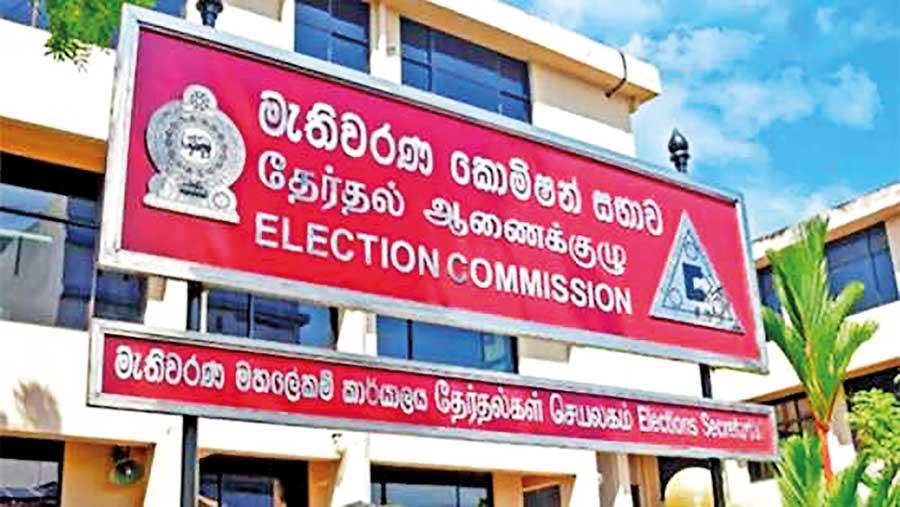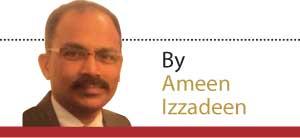13 Jan 2023 - {{hitsCtrl.values.hits}}

The Election Commission should be like Lady Justice

As the government and the ruling parties appear to be resorting to every trick in the book to postpone the long-overdue local council elections, the crucial question is whether elections are the most important matter now when the country is struggling to cope with the economic crisis.
Scaremongering government ministers insist that the economic crisis will turn worse this year and say the funds available should be well managed. Some ministers say the money will be well spent if the Rs. 10 billion or so allocated for elections this year is used to buy paddy from farmers.
The point they are trying to drive home appears to be that elections can wait, and democracy can wait, when the priority is rescuing the country’s economy from the abyss it has fallen into. The same logic is cited by government leaders in defence of their lack of action to crack down on corruption.
Giving legitimacy to this dangerous and democracy-debasing argument is not a healthy sign. So is politicising the misery that has beset the country. An overdose of pessimism is evident in government leaders’ statements calling for the postponement of the elections. Needless to say, such pessimism has a psychological effect to deflate people’s resolve for resilience.
Upholding democracy and holding elections on schedule are as important as the measures the government takes to end the economic crisis. Governmental leaders are well advised to adopt a holistic approach when decisions are made on crucial matters.
A government shouldn’t promote economic objectives at the cost of people’s political rights – and vice versa. On the other hand, inclusive policies will ensure not only balanced development, a prerequisite for sustainable economic growth, but also the people’s socioeconomic and political rights, which include their right to elect or oust a government.
Yet, there have been debates and disagreements over democracy’s role in solving an economic crisis. True, to solve the economic crisis, what is required is not elections, but correct policies. Agree that the correct decisions can be taken by both democratically elected leaders and democracy-detesting dictators if they know their economic onions.
But democracy has an edge over autocracy as far as measures needed to address an economic crisis are concerned.
Let’s analyse the two extreme viewpoints expressed in the ongoing debate over democracy versus economic crisis.
According to one school of thought, the government should concentrate on solving the economic crisis and once this goal is achieved, the people can enjoy democracy and participate in elections. This viewpoint will find currency only in democracies with dictatorship tendencies. In such political cultures, leaders make use of democracy to come to power with the ulterior motive of becoming dictators.
Sri Lankans are no strangers to such betrayals of democracy. Most Sri Lankans are complicit in electing leaders who stand accused of upending democracy and becoming autocratic at best and Hitlerite at worst.
Sri Lankans had lived decades under a state of emergency since the ethnic conflict began in 1983. If only the country had fully fledged democracy, the conflict could have been resolved through peaceful means. But this is a topic for another day. The common thread through the governments since 1983 or even before that – some say 1977 while others say 1970 -- has been one of democracy decimation, with the trend only becoming worse after the war ended in 2009.
This was evident in the 18th and 20th constitutional amendments which, no doubt, were enacted to empower democratically elected leaders to wield their executive powers as autocrats. In hindsight, what this country has experienced is largely a democratic charade or a façade of democracy with an autocratic core.
Now coming back to this argument of giving priority to the economic crisis over democracy, the question is whether this is the ground reality. The main reason is self-centred party politics and it is as obvious as corruption in Sri Lankan politics, public service, and local councils.
The ruling parties do not want to face a humiliating defeat at the elections and thereby give the two main opposition parties -- the Samagi Jana Balawegaya (SJB) and the National People Power (NPP) -- a head start in the race for next year’s presidential election and the parliamentary elections thereafter. The ruling parties – the Sri Lanka Podujana Peramuna (SLPP) and President Ranil Wickremesinghe’s United National Party (UNP) – are well aware that a victory at the local council elections for the opposition will generate a people-power wave all the way to the big elections.
The second argument is that democracy and economic growth go hand in hand and therefore democracy-decimating moves such as postponement of elections will only delay a solution to the economic crisis. Those who support this view point out that socioeconomic development targets are better achieved in democracies than in autocracies.
According to Nobel-prize-winning economist Amartya Sen, development is enhanced by democracy and the protection of human rights. He says that in a democratic society where freedom of the press, speech, assembly, and other human rights are upheld, the likelihood of an honest, clean, good government emerging is more.
He claims that “no famine has ever taken place in the history of the world in a functioning democracy”. This is because democratic governments “have to win elections and face public criticism, and have a strong incentive to undertake measures to avert famines and other {economic} catastrophes”.
These arguments apart, the EC, being an independent institution under the 22nd Amendment, is required to be like Lady Justice. It should not waver in the face of politically charged concerns expressed by vested interests. The commission is expected to be on auto-pilot mode, working unceasingly to successfully hold election after election. Only a major catastrophe like the pandemic can justify a postponement of the people’s turn to exercise their franchise.
The EC says it has confidence that it can hold a successful election with Rs. 10 billion the Treasury has allocated for it this year.
The pulse of the people points to a growing demand for local council elections, even though most of these councils are dens of corruption. Little or nothing moves without oiling the palm of a high official, be it approval for a house plan or a permit to run a factory. Though local councils are responsible for a range of vital services such as street lights, garbage disposal, internal roads, drainage systems, and pest control, in most areas these services come at a price. These councils are nurseries where most politicians cut their teeth in corruption.
So elections allow angry people to oust the present corrupt councillors in a cleansing move, though there is little or no guarantee that the new lot will be clean. But the only solace is that in the social media and Aragalaya era, the voters, especially the young voters, are more awake than before.
09 Jan 2025 46 minute ago
09 Jan 2025 2 hours ago
09 Jan 2025 3 hours ago
09 Jan 2025 3 hours ago
09 Jan 2025 3 hours ago